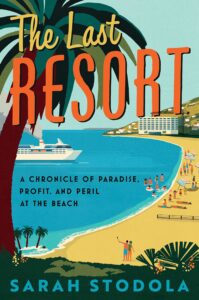
Our arsenal of amazing reviews this week includes Andrea Long Chu on Ottessa Moshfegh’s Lapvona, Lauren Groff on Sarah Stodola’s The Last Resort, Brian Dillon on Hilary Mantel’s Learning to Talk, Dan Piepenbring on Werner Herzog’s The Twilight World, and Julie Zickefooseon Ed Yong’s An Immense World.
“At first glance, Lapvona is the most disgusting thing Moshfegh has ever written…Yet Moshfegh’s trusty razor can feel oddly blunted in Lapvona. In part, her characteristic incisiveness is dulled by her decision to forgo the first person, in favor of more than a dozen centers of consciousness. This diminishment is also a curious effect of Lapvona itself … Lapvona is the clearest indication yet that the desired effect of Moshfegh’s fiction is not shock but sympathy. Like Hamlet, she must be cruel in order to be kind. Her protagonists are gross and abrasive because they have already begun to molt; peel back their blistering misanthropy and you will find lonely, sensitive people who are in this world but not of it, desperate to transform, ascend, escape … This is the problem with writing to wake people up: Your ideal reader is inevitably asleep. Even if such readers exist, there is no reason to write books for them—not because novels are for the elite but because the first assumption of every novel must be that the reader will infinitely exceed it. Fear of the reader, not of God, is the beginning of literature. Deep down, Moshfegh knows this….Yet the novelist continues to write as if her readers are fundamentally beneath her; as if they, unlike her, have never stopped to consider that the world may be bullshit; as if they must be steered, tricked, or cajoled into knowledge by those whom the universe has seen fit to appoint as their shepherds … It’s a shame. Moshfegh dirt is good dirt. But the author of Lapvona is not an iconoclast; she is a nun. Behind the carefully cultivated persona of arrogant genius, past the disgusting pleasures of her fiction and bland heresies of her politics, wedged just above her not inconsiderable talent, there sits a small, hardened lump of piety. She may truly be a great American novelist one day, if only she learns to be less important. Until then, Moshfegh remains a servant of the highest god there is: herself.”
–Andrea Long Chu on Ottessa Moshfegh’s Lapvona (Vulture)

“Stodola is, like me, skeptical about the beach idyll, constantly seeing the darker forces of environmental and cultural degradation amid all the luxury she describes. She is at her most incisive when she calmly, clearly lists what is lost when beach resorts take over a place … Stodola’s careful critique of the invasive species that is the luxury resort helped clarify my beach-hater’s reflexive outrage. And yet, as she piled on her profiles of resorts all over the world—and Tulum blended into Sumba, which blended into Barbados, which blended into Bali, which blended into Acapulco, their high-priced cocktails and corrosive effects becoming a repetitive blur—I felt dizzy and exhausted. Luxury can swiftly glut. I also felt morally queasy about her pursuit. Her travels officially counted as research, I understood. But I began to wonder how someone so perceptive, intelligent, and ethical could so studiously anatomize the pervasive harm wreaked by these places, and yet take long-haul flights around the globe to spend time at many (many!) more of them than nailing her argument required. She recognizes the ways in which she is complicit—she makes that clear in The Last Resort—and still she kept choosing to be complicit … If I can’t help feeling that Stodola tries to have it both ways, which I read as a kind of hypocrisy, the reason I find it hard to swallow is that I so often do the same … If we all paid attention to what is happening to the planet in the Anthropocene, we’d be running around with our heads on fire.”
–Lauren Groff on Sarah Stodola’s The Last Resort: A Chronicle of Paradise, Profit, and Peril at the Beach (The Atlantic)
“How unexpected, how consoling, that one of the best-selling British novelists of recent decades should also be such a peculiar, stringent prose stylist—and gothic affronter of authority … Mantel evokes beautifully a place ingrained with the soot and sweat of labor, a time populated with racist landlords and ‘dental cripples,’ when relatives were the only domestic visitors, and one’s parents seemed to have no actual friends … The drowned village is one of the larger conceits in Learning to Talk; usually, Mantel’s imagery is less allegorically freighted, less amenable. Her particular, unsettling skill lies in discovering queasy equivalents for physical sensations and emotional states—the body is always there, as metaphor, to remind us of its unmetaphorical heft and threat … The innocent cruelty of childhood, youth’s horror at the alien predicaments of adult bodies and adult lives: Mantel conjures all this with nerveless precision … Sickness also haunts Learning to Talk: an intermittent presence in childhood, a horizon, perhaps, toward which everything is moving. It’s part of the wider project or tendency in Mantel’s work: to explore, as she does so lucidly and strangely here, the hinterland between emotional history and anxious embodiment.”
–Brian Dillon on Hilary Mantel’s Learning to Talk (4Columns)
“Few writers are better equipped to capture a place so overwhelmingly opaque that it lapses into absurdity, and a life that became an exercise in purposed purposelessness. In Herzog’s hands, Lubang exists outside of time, and Onoda’s war has the eerie gravity of a thought experiment come to life … The Twilight World has the unenviable task of dramatizing nearly three decades of acute emptiness. Onoda and his companions lived like a millenarian cult, anticipating a salvation that never came—the action was all in the future, and all in their minds. Herzog has written a clipped, economical account that sometimes explodes into lyricism, turning their waiting into a thing of numb, antic beauty. His trick is not to put us in Onoda’s head but to remain so resolutely outside of it that we feel immured in the same wilderness … Herzog has always been attuned to the ways in which survivalism functions as a form of existentialism. The brutal irony of The Twilight World comes in moments like these, when Onoda succumbs to what a psychologist might call patternicity. He finds meaning everywhere, hearing signals that soon fade into the endless noise … To call it dark, dry, or deadpan is an understatement; it’s more like cosmic farce, or field recordings of the hiccups of fate. The novel’s most humorous events are also its most despairing … Herzog, who has made a career studying the emptiness of meaning-making, celebrates Onoda’s noble crusade even as he dismisses its abject triviality; it takes a kindred spirit to admire someone who held himself hostage to a lost cause.”
–Dan Piepenbring on Werner Herzog’s The Twilight World (The New Yorker)
“… a dense and dazzling ride through the sensory world of astoundingly sophisticated creatures. Who wouldn’t want to tag along on a field research trip or peek into the lab of a sensory biologist? … rich with stories from lab and field, with lucid explanations of the mechanics behind sensory perception. There is more than enough mind-boggling science, with delightfully distracting footnotes on most pages and a whopping 45-page bibliography. Yet Mr. Yong’s storytelling will carry most readers through the thicket with ease … It’s Mr. Yong’s task to expand our thinking, to rouse our sense of wonder, to help us feel humbled and exalted at the capabilities of our fellow inhabitants on Earth. This rich and deeply affectionate travelogue of animal sensory wonders ends with a plea to us—noisy, light-polluting anthropoid apes—to stop and consider others’ needs: for silence, for darkness, for space. Despite the stunning discoveries chronicled here, what we don’t know about these animals’ experience in the world we share is still virtually . . . everything.”
–Julie Zickefooseon Ed Yong’s An Immense World: How Animal Senses Reveal the Hidden Realms Around Us (The Wall Street Journal)

